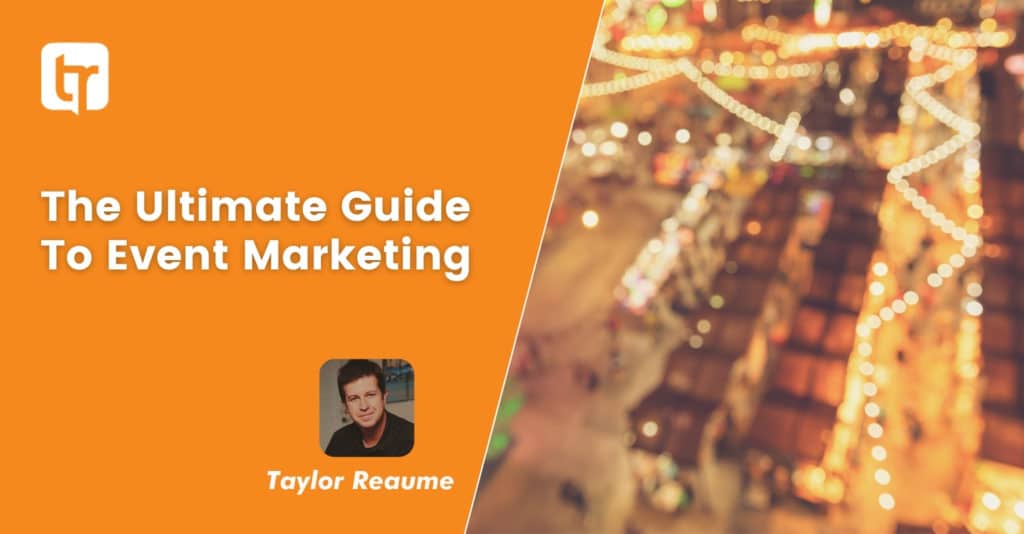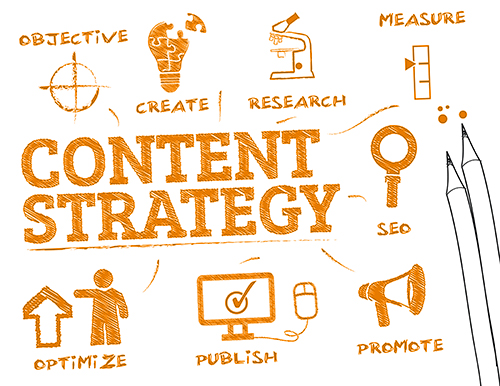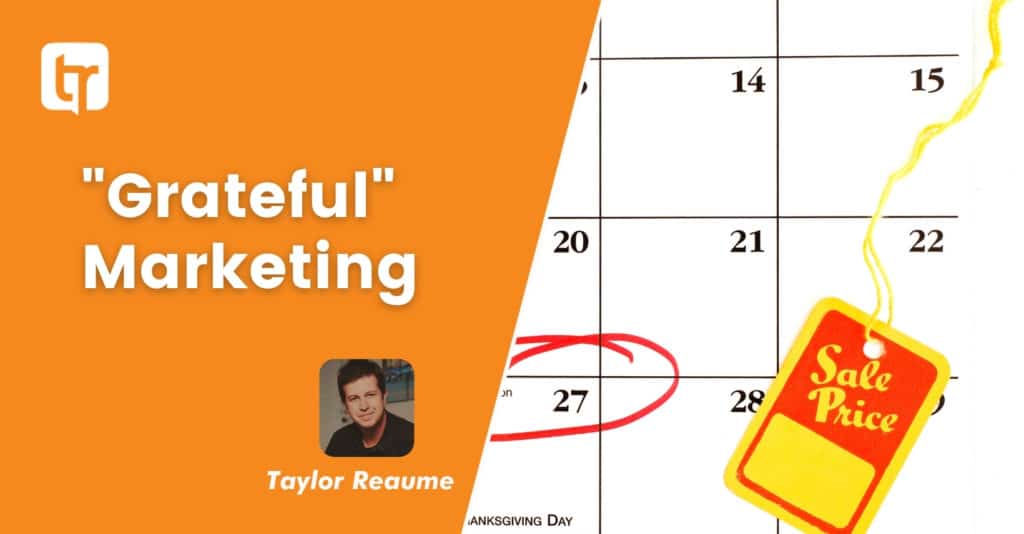The Ultimate Guide To Event Marketing

The Ultimate Guide To Event Marketing
By Taylor Reaume
You’ve sent out the email invites, put a link on your web site and even made a post on your company blog. That’s plenty of promotion for your upcoming event, right? Not anymore! Lately, I hear more and more event planners becoming increasingly frustrated with event marketing in the web 2.0 landscape. Given the current economy, even savvy event planners are struggling to find sponsors and speakers. Below I will illuminate some best practices for event marketing with a particular focus on Internet marketing and online promotion.
Online promotion is a key aspect to planning an event nowadays. Without online promotion, no-one will know about your event and you will have no registrants, no attendees. This guide will cover event promotion, and provide insights on how to promote events online.
That said, here are some good starting questions to reflect upon:
- Who is your target audience (including sponsors)?
- Which online channels are they present on?
- What is their concern that is being addressed by your event?
Below are the steps to follow in order to expand awareness for your event.

STEP 1: Keyword Research: Find 10 keywords to target. Try to find low competition, high search count keywords utilizing keyword research tools. Ask a web professional to develop a keyword research report for you.
STEP 2: Article Writing: Write 10 articles about your event (1 article around 1 niche keyword) 500 words each and use “Theme” Words.

STEP 3: Tags: Develop 10 Titles and 10 Descriptions for each page, and optimize each page for the search engines. Title can be 65 words or less, but more is okay. Try to include your important keywords in the beginning of the title. Write your event description with your target keywords in mind – not more than 250 characters. Write at least 3 tag keywords for each article. Now that you have a set of Titles, descriptions, keywords, you have a data set to use for social bookmarking submissions, directory submissions and link campaigns.

STEP 4: Event Directories: Go to the event directory web sites below, and register your event. This is a general list widely accepts most events. However, it’s also a good idea to do a Google Search in your town, and find local event directories online for your area. Submitting your event to various event directories doesn’t cost you any $. It only brings new delegates and helps you improve your Search Engine rankings.
Eventful – http://eventful.com
Eventful will allow you to search, create, promote and track online events in your local area. Search by location or category to make it easy to find the events you want to attend. You can also keep track of your favorite events by added them to your calendar. Eventful will also all you to create a profile, group, and friends list to stay in touch with family, friends, colleagues or industry leaders. I love this service because they send an email every week to people in your area with the events that are about to happen.
Night Out – https://nightout.com
NIGHTOUT has emerged as one of the most innovative and specialized event ticketing platforms on the web today, used by thousands of top event producers, promoters, and venues. This platform can give your event a good deal of exposure.
Meetup – http://www.meetup.com
Meetup is probably the most mainstream event website on the web currently. Meetups niche is allowing people to create local groups and “meetup” at local establishments in the area. Their goal is to create an environment that is easy for industry people and groups to meet, interact, discuss, and share topics that matter to them. Create your own MeetUp group or join other groups. Sometimes, if your event is really interesting, administrators of other groups will be happy to pass the word to their members.
CitySearch – http://citysearch.com
This local search engine is here to stay. It’s getting very popular and can make your event visible to thousands of people.
Eventbrite – http://EventBrite.com
Eventbrite is another popular event site known for their easy to use online ticketing tools. Listing your event here is a smart idea because they have a large presence on the web and come up frequently when people search for local events.
STEP 5: Social Networking: Go to the social networking web sites below, and start generating a buzz around your event. Social Networking sites such as Facebook, LinkedIn offer numerous opportunities to promote any event. You can create & leverage a community (e.g. Facebook Page or LinkedIn Group) to promote an event or a conference. The status messages at these sites (particularly Facebook) can really create a powerful personal buzz & engagement in the target community. Lastly, the core team can use their own network (by sending event invites; e.g. on LinkedIn) to spread the word about the event. *remember to use your target keyword phrases when commenting and using your social network. (use your target keyword phrases!)

LinkedIn http://www.linkedin.com
Let all your contacts know about your event. In addition to that, you can join dozens of business networking groups based out of your city and post your event to their discussion boards.
Facebook http://www.facebook.com
Use Facebook to find groups and people in your area, and invite them to your event. You can also use Facebook Ads and deliver them to people in a certain location.
STEP 6: Setup Event Blogs: Goto the following sites and setup free blogs. Every Friday, make a 300-500 word post about your upcoming event (use your target keyword phrases!) The blog is a very important part of a successful online marketing strategy. Not necessarily the traditionally-defined blog, but the ‘blog’ that has emerged from within the context of Web 2.0 as it exists today. Whether it’s a pre-event, during the event or post event, you can highly leverage both Blogging & Microblogging (e.g. Twitter). It’s a great idea to launch your event blog (may be even before your conference website) while you are launching the website/microsite for your event. In addition, you can leverage other relevant blogs (create blog badges like Proto did) to promote your events. Live conference blogging is a great tool to create valuable content for event promotion in addition to enriching the experience of the delegates. As a central platform, blog also helps you promote other social media channels & content (e.g. photos, videos, presentations, twitter).
WordPress http://www.wordpress.com
Starting a wordpress blog about your event is both free and easy. There are thousands of templates out there for word press blogs. Managing the content for an event is extremely easy with WordPress.
HubPages http://www.hubpages.com
Hubpages is another social network site that allows you to create a content online for free.
Blogger.com http://www.blogger.com
This is one of the oldest free blog sites where you can post anything about anything. Start a free blog about your event, and post consistent updates 2-3 months prior to your event.
STEP 7: Social Bookmarking: Open up the document you made in Step 2 (10 titles, 10 descriptions, 3 tags each) Setup your free social bookmarking accounts. Every Friday, make a social bookmark using your target keyword phrases. Social networking websites are one of the best ways to promote to people. YouTube.com, Twitter.com, Facebook.com, Gather.com amongst hundreds of other sites are easy ways to generate a lot of buzz quickly. Plus, promoting your event via this outlet is generally free or low cost, so not only will you be able to publicize your event swiftly, but cheaply as well.
Here are the Top Bookmarking Sites
Top 15 Most Popular Social Bookmarking Websites | April 2016
Here are the top 15 Most Popular Social Bookmarking Sites which is a continually updated average of each website’s Alexa Global Traffic Rank, and U.S. Traffic Rank from both Compete and Quantcast.“*#*” Denotes an estimate for sites with limited data.
1 | Facebook
3 – Compete Rank | 3 – Quantcast Rank | 2 – Alexa Rank | Last Updated: April 1, 2016.
2 | Twitter
19 – Compete Rank | 8 – Quantcast Rank | 8 – Alexa Rank | Last Updated: April 1, 2016.
3 | Pinterest
29 – Compete Rank | 13 – Quantcast Rank | 26 – Alexa Rank | Last Updated: April 1, 2016.
4 | Google Plus+
*24* – Compete Rank | *28*– Quantcast Rank | NA – Alexa Rank | Last Updated: April 1, 2016.
5 | Tumblr
53 – Compete Rank | 13 – Quantcast Rank | 34 – Alexa Rank | Last Updated: April 1, 2016.
6 | Reddit
227 – Compete Rank | 27 – Quantcast Rank | 60 – Alexa Rank | Last Updated: April 1, 2016.
7 | StumbleUpon
699 – Compete Rank | *50* – Quantcast Rank | 152 – Alexa Rank | Last Updated: April 1, 2016.
8 | Digg
*950* – Compete Rank |2,393 – Quantcast Rank | 492 – Alexa Rank | Last Updated: April 1, 2016.
9 | MetaFilter
2,139 – Compete Rank |458 – Quantcast Rank | 3,600 – Alexa Rank | Last Updated: April 1, 2016.
10 | Newsvine
2,071 – Compete Rank |*240* – Quantcast Rank | 3,934 – Alexa Rank | Last Updated: April 1, 2016.
11 | Folkd
NA – Compete Rank | NA – Quantcast Rank | 2,093 – Alexa Rank | Last Updated: April 1, 2016.
12 | FARK
3,873 – Compete Rank |2,503 – Quantcast Rank | 2,943 – Alexa Rank | Last Updated: April 1, 2016.
13 | Scoop.it
6,218 – Compete Rank |10,152 – Quantcast Rank | 591 – Alexa Rank | Last Updated: April 1, 2016.
14 | Slashdot
9,118 – Compete Rank |7,322 – Quantcast Rank | 1,631 – Alexa Rank | Last Updated: April 1, 2016.
15 | Delicious
10,072 – Compete Rank |7,032 – Quantcast Rank | 1,235 – Alexa Rank | Last Updated: April 1, 2016.
STEP 8: Video Marketing: Create a 30 second-60 second promo video about your event. This can be done easily in Microsoft Powerpoint, or by using Windows Movie Maker. Or you can go get a generic video from a stock video site and then load it in Windows Movie Maker to add a small intro and outro about your event. Video’s are a tremendous boost to search engine rankings, and will contribute to more trust and credibility at your web site. Video Tags, Video Title, and Video Descriptions can all be utilized to maximize your online marketing efforts. One of the benefits of internet advertising as opposed to traditional, physical advertising is the level of interactivity that can be reached at a relatively low cost. Technologies such as Flash have allowed marketing managers to include robust, high-quality audio and video in their advertisements without forcing consumers to suffer through long downloads or install third-party software.
- Youtube http://www.youtube.com
Put a Youtube video on your website about your event, and watch your ranking skyrocket. Another idea is to use Pay Per Click to drive traffic to your video page, which increases your Youtube Views, and your ranks on Youtube Search Engine. - Vimeo http://www.vimeo.com
Vimeo is a high quality HD video site that has been gaining popularity rapidly, especially in the film world. - Google Videos http://video.google.com
Videos are excellent for helping boost organic rankings for your event pages. Upload your event related snippets to a free Google Videos Account and watch your traffic levels!
STEP 9: Online Press Releases: Online PR enables you to directly reach out to global audience but also help you increase your Search Engine rankings. Writing press releases and distributing them to television and radio stations, websites, specialized magazines, and newspapers is a great way to get your event promoted to a larger audience. Depending on whether or not your event is more localized or on a national or international level will determine which media to contact, but regardless of who it is it is a great way to have people read about your event. In addition to sending out press releases to the media, it is also a good idea to invite journalists to the event so that they can report on it and your event can receive publicity afterward.

STEP 10: CRAIGSLIST: Create a few posts on Craiglist and give away tickets with a coupon code. This is a particularly effective tactic because it drives groups of people to the event website, and expands awareness for the event via word of mouth.
STEP 11: Listing in Community Newspapers and Websites In addition to writing press releases and contacting media for publicity, simply listing your event in the “Community Events” section of local newspapers and on community websites is an effective way to reach your audience. Many people tend to read the “Events” section to quickly see what is going on and so this strategy works very well. Don’t be afraid to contact local newspapers and other publications to inform them about your event. In most cases, they will find this information useful and relevant, and they’ll be happy to share it with their readers. Journalists love writing about current events in the community.
STEP 12: Mailers: Sending event invites with postcard mailers is still a viable means of spreading the word about your event. However, more than the message, it’s the database of the recipients, which determines the success or failure of your email campaign. While signing up for media partners (who promise to send your event mailer to their database), don’t just be enticed by the volume of their database – relevancy of their member base is much more important. Sending your mailer to the wrong audience can be a huge waste of time and money. Consider an urgency angle with your advertising, for example, consider these two headlines: ‘MY EVENT’ or ‘7 Days to MYEVENT- Join Now!’ (can you guess which ROI is better?)

STEP 13: Leveraging Content (Photos, Presentations, and Videos etc): Even today, most of the events don’t last beyond the day on which they happen. As such, there is an amazing opportunity to leverage the event content (in the form of session takeaways (an important reason for live blogging), photos, presentations, videos) to promote the event & the organizer’s brand – this can significantly contribute to the next year’s conference or other conferences by the same organizer. So, please plan to capture and use the wealth of content which gets created during the event. For e.g. Social Media Channels – Speaker Presentations, Event Photo Galleries, Session Videos have driven thousands of views for various events.

STEP 14: Sponsors The relationship with your sponsors is incredibly important when organizing a good event. While you help your sponsors by promoting them to your event attendees, they can also assist in promoting your event. This can be done on their website, in store by displaying fliers and posters, and even through their newsletters and mailings. Sponsorship is a two way street and can be very effective in promoting your event to people that would be interested in attending.

STEP 15: Word of Mouth Simply put, talk about your event with others. Information spreads rapidly through people talking with each other. Individuals are more likely to attend an event if their friend is going and speaks highly of it. It is important to make your event sound interesting and unique when talking about it with others so that they will in turn pass the information along and get more people to want to come to the competition. “Word of mouth” marketing, i.e. the water cooler effect, is very poweful and is often ignored during event planning. If an influential person at a company or in a group likes something, they will tell their friends. So, create ways to influence the influencer. Reach employees while they are at work with special offers for entertainment events looking to move distressed inventory or special VIP packages. One common influencer strategy is to host a group of our most influential customers and treat them to the event for free during the early stages of the event and an off night where the tickets would have gone dead anyway. By turning what would have been a lost opportunity (a seat that would not sell) into a marketing tool, you have the opportunity to influence many influencers who then share their experience with employees at their corporation or group, thereby generating word of mouth publicity.
STEP 16: Email Signature: Update your email signature to include a blurb and a link to the event (especially effective for the sales and marketing folks)
STEP 17: Email Auto Responses: You’re going to be out of the office this week, but still need a few more registrants. How about adding a link to your email auto response? Something to the tune of “I am currently out of the office and will return Friday 5/4. I hope you can join us on May 8 for our upcoming Webinar titled “How to Create a Successful Email Campaign.” Register Today!”
STEP 18: Vanity URLs: If the URL for your event registration is long and confusing, create a short “vanity” URL that will redirect people. Make it something you can easily write down if you want to jot it on a business card, flyer, napkin, etc.. Traditional media (including a pen and paper!) can still work in your favor even if it’s an online event
STEP 19: RSS Feeds: You’ve added a post to your blog about the upcoming webinar or event, but consider adding an extra push just to the RSS feed as the event gets closer.
STEP 20: Instant Messenger: Love it or hate it, instant messengers exist in the workplace. Make yours work for you by adding a short promo in your “status” message.
STEP 21: Find People with Lists: I can guarantee that there are at least 100 people in your area that have email lists of other people in your area. Offer them an incentive –sometimes it’s not even necessary, and ask them to let people know about your event through a blog post, a short announcement in their newsletters or a simple email. Offer them a small incentive, like a free ticket perhaps.

STEP 22: Do a Google Search: If you live in New York, search on Google for “New York Events”. There are hundreds of niche-websites that revolve around events in local area; they can give your event great exposure. Try these as well:
STEP 23: Event Posters: Get signs or banners up at the venue space. Posters should match all direct mail on online media

STEP 24: Print up invite cards, or ticket: A hard copy on paper works the best. “You are invited” or “VIP Invite” Email invites can supplement your efforts.
STEP 25: Sponsor Mini Events: One cost-effective way to raise awareness about your event is to simply go on-site to organizations and companies and create a fun afternoon focused on the events you promote. Raffle off tickets to the events to generate awareness amongst hundreds or thousands of potential consumers.

STEP 26: Event Evangelism: When talking about your event to potential buyers, talk about the experience they’re going to have as opposed to standard promotional talk. Many times you will need to completely re-write copy given to to you from the event because you want it to talk to the customer in a way that helps them understand the experience. Customise the copy to talk to the target audience-get inside the conversation in their head. For example, if your event promotes a Broadway star who isn’t in the mainstream media, you might consider shifting your focus to place more attention on the storyline if the crowd isn’t theater savvy. You should remember that interest and attendance is really driven by demand. Don’t get wrapped up with thinking the event is “great” and then not understanding why no-one is coming to it. Another really good approach if it is an event that is going on over many weeks or more or one that may be yearly is to survey the audience and understand clearly what folks like and what they don’t. Have the objective to really understand the demographics of the people who respond positively and negatively so you can constantly tweak marketing to focus on the people who are most likely to show up. Most events have a budget and large or small, a focused approach using data and analysis will help maximize the marketing dollars spent. The above is mostly for longer running events, but there are ways to adapt the above to a one-day or shorter event. To do that, you want to generate word-of-mouth selling around the anticipation of the event or the “buzz” of the event. This is a tougher as you are relying on the event topic or presenter to hold the event. Bottom line you should try to spend the time really creating the value proposition and focusing intently on your target audience.

It is important to remember that while these all are very effective ways to promote your events, it is usually necessary to mix these tactics to reach your target audience. Also, be sure your event software has promotion tools like email marketing to previous attendees. I hope this guide to event marketing online has helped you develop a better understanding of event marketing and promotion.




